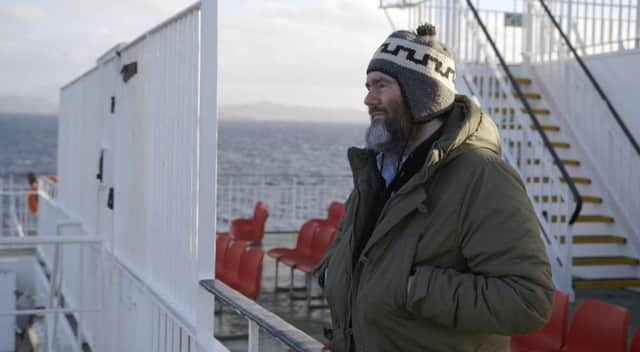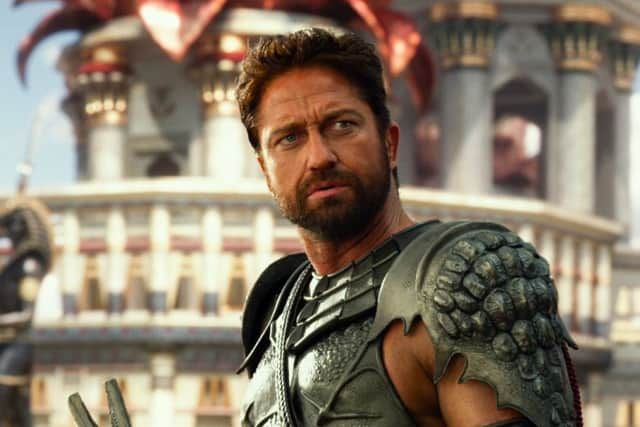Film review: Where You're Meant To Be | Gods of Egypt | Tale of Tales


Conflict is drama, but it’s also a rich source of bemusement and enlightenment in Where You’re Meant to Be (****), Paul Fegan’s effortlessly entertaining and beautifully shot documentary about ex-Arab Strap frontman Aidan Moffat’s efforts to modernise traditional Scottish folk ballads by filtering them through the poetically profane prism of his own distinctively urban point of view. Sitting in his Glasgow rehearsal room, trying to figure out how to make old songs relevant for audiences with no connection to their original context, Moffat jokes that “folk music needs a good editor” and blithely assumes these songs are there for others to embellish and adapt. But he’s soon disavowed of this notion when he meets the late Sheila Stewart, a traditionalist who wastes no time making her displeasure clear at what she calls his “blootering” of the songs she spent her childhood learning and her adult life preserving through performance. In some respects she has a point. When Moffat first sings his version of one of her songs, it becomes evident he’s taken everything at face value and hasn’t understood the metaphorical significance of the original lyrics. To his credit, Moffat is a good sport about admitting his ignorance and – as vintage news reports regarding Arab Strap testify – is used to being criticised for rubbing people up the wrong way. But he’s also right about the value of updating the songs, something highlighted by a climactic gig at Glasgow’s legendary Barrowland Ballroom, itself revealed as a magnificent mix of tradition and modernity. In less subtle hands, Moffat and Stewart’s disagreements could easily have been amplified to form the spine of the movie. Instead they become the basis for a much more interesting exploration of Scottish identity, particularly as the film delves further into Stewart’s itinerant life (there’s a great scene of her disparaging the tartan and shortbread image of Scotland as she skins a rabbit in her kitchen) and then takes on the shape of a road movie as Moffat travels further out of his Central Belt comfort zone to perform far away from his indie fanbase. Sadly, Stewart died shortly after the tour, so she never got to see the finished film, but Moffat’s beautifully written narration (delivered in the form of a letter to a lost friend) gives the film a rueful and elegiac quality befitting its themes and its subjects’ brief but illuminating relationship.
When Gods of Egypt (*) tanked Stateside earlier this year, director Alex Proyas took to social media to describe the critics who slated it as “vultures pecking at a dying carcass”, which is pretty funny given that this buck-passing reprimand inadvertently acknowledged the film itself wasn’t any good. A campy, B-grade, swords-and-sandals epic with stiff action, ripe acting and a plot too convoluted and self-important to be fun, there’s certainly a fetid, cadaver-like quality to the film’s misguided attempt to franchise Egyptian mythology in the style of Clash of the Titans. Gerard Butler takes top billing as an exiled god who seizes control of his brother’s kingdom by plucking his nephew’s eyes out during his coronation and announcing to the soon-to-be-enslaved masses that entry into the afterlife will now conform to a bribery system. Bellowing much of his dialogue in that curiously Americanised Scottish slur he’s been trading on since 300, Butler isn’t the worst thing in Gods of Egypt, but he’s hardly a selling point and definitely isn’t compelling enough to offset the blandness of its heroes. Those take the form of a young thief, played by Australian actor Brenton Thwaites, who makes a deal with the aforementioned and newly sightless god Horus (Game of Thrones star Nikolaj Coster-Waldau) to steal back his eyes in return for his help resurrecting his recently killed true love (Courteney Eaton). Geoffrey Rush pops up as Ra, the sun god, while Chadwick Boseman (one of the few actors of colour in the film) cameos as Thoth, the god of wisdom. Although these gods are nine-foot-tall shape-shifters able to summon magnificent creatures out of thin air, they remain unimpressive on the big screen, perhaps because the relentless CGI overload means there’s nothing special about any of the effects.
Advertisement
Hide AdGomorrah-director Matteo Garrone deploys more practical effects than CG ones for his adult fairytale Tale of Tales (**), but in going back to the 16th century folktales collected by Neapolitan poet Giambattista Basile, he mostly revels in the horrible grotesquery of the rich and powerful as they try to bend the world to their individual wills. Cutting between a triptych of stories from neighbouring kingdoms, the film – Garrone’s first English-language effort – offers up ogres, crones, oversized fleas and fertility rituals, and features the likes of John C Reilley, Vincent Cassel and Salma Hayek giving wildly diverse and over-the-top performances that are more uneven than unsettling.


Out to shock, but never coming close, Bang Gang (A Modern Love Story) (**) is one of those coming-of-age films that believes it’s reinventing the wheel simply because it zeros in on the sex lives of teenagers. Set amidst a group of promiscuous French adolescents who decide to test their limits by organizing swinging parties with their friends, the film may well be trying to say something valid about teen sex in the age of easy-access internet porn, but writer/director Eva Husson’s decision to shoot this sub-Larry Clarke story with the same dreamy aesthetics found in the work of Sofia and Gia Coppola doesn’t make it new. The moralistic ending is also a bit of a cop-out.